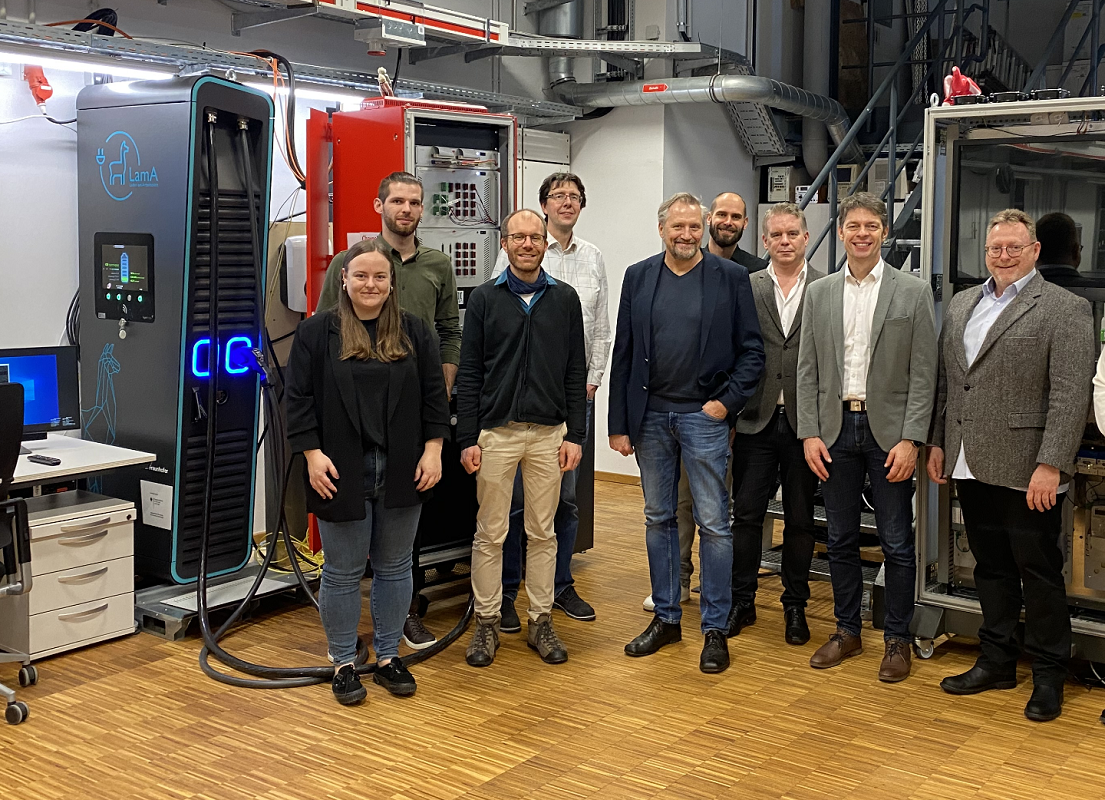News #05
Project Launch of UtiliSpaces: Control and Power Regulation within the Smart Meter Infrastructure
To ensure the stability of the distribution grid in critical situations, grid operators should be able to temporarily reduce the power of controllable consumers such as heat pumps and charging stations. The communication to enable this will operate via the so-called Controllable Local System (CLS) channel of the Smart Meter Gateway (SMGW). The joint research project "UtiliSpaces", funded by the German Federal Ministry of Education and Research (BMBF), is addressing the implementation challenges in the practice. The Fraunhofer Institute for Energy Economics and Energy System Technology IEE is project coordinator. The role of the Fraunhofer Institute for Solar Energy Systems ISE in the project is to test hardware and software for complex system controls in its Digital Grid Lab.

To ensure the stability of the distribution grid in critical situations, grid operators should be able to temporarily reduce the power of controllable consumers such as heat pumps and charging stations. The communication to enable this will operate via the so-called Controllable Local System (CLS) channel of the Smart Meter Gateway (SMGW). The joint research project "UtiliSpaces", funded by the German Federal Ministry of Education and Research (BMBF), is addressing the implementation challenges in the practice. The Fraunhofer Institute for Energy Economics and Energy System Technology IEE is project coordinator. The role of the Fraunhofer Institute for Solar Energy Systems ISE in the project is to test hardware and software for complex system controls in its Digital Grid Lab.
For the energy transition to succeed, the energy consumption must be able to adapt to the energy supply in the future. Therefore, in accordance with the new section in the Energy Industry Act (§14a EnWG), grid operators are able to regulate controllable consumers such as heat pumps or wallboxes during critical grid situations. The UtiliSpaces project is researching how the IT-implementation of these regulations can be achieved with a reliable process chain. The project group is testing different combinations of hardware and software solutions as well as different organizational constellations of metering operators.
Fraunhofer ISE carries out its laboratory tests in its Digital Grid Lab, where different use cases for system controls can be simulated. For this purpose, a test stand with smart meter gateways, control boxes and submeters from various manufacturers will be set up. The project partners will contribute their CLS management systems and provide access options as active external market participants (aEMT). The controllable consumers (charging stations) are integrated partly as real systems and partly as digital twins using the Power Hardware-in-the-Loop system in the Digital Grid Lab. “In particular, the variety of devices and the available flexibility options, e.g. taking on different operator roles, provide us with the opportunity to extensively test regulatory requirements and associated processes. All grid operators in Germany are currently facing similar challenges. We are working on a core task for the future grid operation," explains Marco Mittelsdorf, the engineer responsible for laboratory testing at Fraunhofer ISE.
Fraunhofer IEE is also setting up a virtual laboratory environment to test scaling issues. This virtual lab will simulate the processes with a large variety of emulated smart meter gateways and flexible energy systems. Subsequently, practical field tests are planned for the systems of all project partners.
Other project content relates to the practical handling of devices during switching operations by grid operators or energy service providers that are managed by competitive metering operators. Additional uses of the CLS channel for submetering are also to be demonstrated and further developed in the project. Cross-company usage concepts will be developed for the collected data and data room technologies will be tested.
The industy partners in the project are Energienetze Mittelrhein GmbH & Co. KG (enm), MVV Energie AG, ZENNER Connect GmbH and enisyst GmbH.
Last modified: